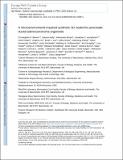A microenvironment-inspired synthetic three-dimensional model for pancreatic ductal adenocarcinoma organoids
Author(s)
Griffith, Linda
DownloadAccepted version (3.376Mb)
Open Access Policy
Open Access Policy
Creative Commons Attribution-Noncommercial-Share Alike
Terms of use
Metadata
Show full item recordAbstract
Experimental in vitro models that capture pathophysiological characteristics of human tumours are essential for basic and translational cancer biology. Here, we describe a fully synthetic hydrogel extracellular matrix designed to elicit key phenotypic traits of the pancreatic environment in culture. To enable the growth of normal and cancerous pancreatic organoids from genetically engineered murine models and human patients, essential adhesive cues were empirically defined and replicated in the hydrogel scaffold, revealing a functional role of laminin-integrin α3/α6 signalling in establishment and survival of pancreatic organoids. Altered tissue stiffness-a hallmark of pancreatic cancer-was recapitulated in culture by adjusting the hydrogel properties to engage mechano-sensing pathways and alter organoid growth. Pancreatic stromal cells were readily incorporated into the hydrogels and replicated phenotypic traits characteristic of the tumour environment in vivo. This model therefore recapitulates a pathologically remodelled tumour microenvironment for studies of normal and pancreatic cancer cells in vitro.
Date issued
2022Department
Massachusetts Institute of Technology. Department of Biological EngineeringJournal
Nature Materials
Publisher
Springer Science and Business Media LLC
Citation
Griffith, Linda. 2022. "A microenvironment-inspired synthetic three-dimensional model for pancreatic ductal adenocarcinoma organoids." Nature Materials, 21 (1).
Version: Author's final manuscript